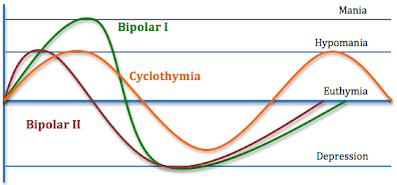WHAT IS BIPOLAR DISORDER ?
Bipolar disorders are mood disorders that is characterized by alternating periods of happiness and sadness. People with bipolar disorder can swing from extreme highs of happiness to extreme lows of sadness, sometimes very quickly, but usually it comes in phases of several month. This can often feel confusing or even frightening for the sufferer and their loved ones. The good news is that effective treatments are available for people with bipolar disorder. Also bipolar patients have better fate than schizophrenics.
At our centre, we have a wealth of knowledge and experience with the condition and can help you take the right steps to move forward in improving your quality of life. The first is recognizing there is a problem, and seeking an accurate diagnosis.

TYPES OF BIPOLAR DISORDERS :
The various types of Bipolar Disorders and their symptoms are described below :
BIPOLAR I
This applies to patients who have one or more manic or mixed episodes, often combined with depression. Patients with Bipolar I Disorder typically have severe manic (high)
episodes along with shorter depressive episodes. In other words, they are 'high' more often than they are low - which can make this condition hard to recognize.
BIPOLAR II
Patients with Bipolar II Disorder tend to have longer periods of depression that alternate with shorter manic episodes. In other words, depression is the dominant factor.

CYCLOTHYMIA
This is Bipolar Disorder with less obvious highs and lows. Although a comparatively milder condition, it can still have a serious impact on quality of life.
BIPOLAR DISORDER - NOT OTHERWISE SPECIFIED
When a person doesn't follow all the patterns of other known forms of the condition, they are said to have BD-NOS
Bipolar Disorder is thought to be caused by a combination of biochemical, genetic and environmental factors. It may be due to a lack of serotonin (the 'happy' hormone) or an irregular release of dopamine (which helps control a person's relationship to pleasure and reward) in the brain.
Bipolar Disorder tends to run in families and may lie dormant for years, only to be triggered by a traumatic event such as a relationship break-up, divorce, job loss, change of home, bereavement, etc.
CAUSES OF BIPOLAR DISORDERS :
Bipolar Disorder is thought to be caused by a combination of biochemical, genetic and environmental factors. It may be due to a lack of serotonin (the 'happy' hormone) or an irregular release of dopamine (which helps control a person's relationship to pleasure and reward) in the brain. Bipolar disorder tends to run in families and may lie dormant for years, only to be triggered by a traumatic event such as a relationship break-up, divorce, job loss, change of home, bereavement, etc.
SYMPTOMS OF MANIC PHASE :
The so-called 'manic' stage of the condition means a person is likely to be bursting with energy and ideas, intense and prone to seemingly bizarre behaviour such as excessive spending, heavy drinking or wild sexual behaviour.
Symptoms include:
1).
Excessive talkativeness
2).
Considering himself / herself great & other to be inferior
3).
Much happiness
4).
Sleeplessness
5).
Feeling on the top of world
6).
Hyperactivity
7).
Aggression especially when opposed or prevented by someone
8).
Expansive mood
9).
Loss of inhibition
10).
Insomnia
11).
Grandiosity
12).
Exaggerated euphoria
13).
Racing ideas
14).
Rapid speech
15).
Reckless behavior
16).
Expansivity

SYMPTION DURING DEPRESSED PHASE OF BIPOLAR MOOD DISORDERS
While a person battling depression may not realize they have the condition, fortunately it tends to be fairly straightforward for us to identify here at the Dr Satyajeet Singh, MD, AIIMS Patna Neuropsychiatrist (ex) .
The patient may feel disproportionately angry or sad, seemingly about nothing.
They may have frequent crying bouts and fantasies about dying.
Patients often say their lives have become unmanageable, they feel overwhelmed and their confidence is at rock bottom.
Symptoms include:
1. Sad Mood
2. Weeping Spells
3. Lethargy
4. Dullness
5. Sleeplessness
6. Nightmares
7. Anxiety, Guilt, Pessimism, Low Self Esteem
8. Thoughts of killing himself / herself, i.e. suicide

BIPOLAR DISORDER TEST
Many factors are involved in diagnosing Bipolar Disorder. Factors that we will consider before making a bipolar diagnosis include:
1. A patient's family medical history, such as whether anyone has or have had bipolar disorder/depression
2. Any pronounced mood swings - and for how long they have been occurring
We may also suggest a thorough examination to look for illnesses that may be causing the symptoms, such as thyroid problems or possible drug use.
Note: Drug use may cause some bipolar symptoms. But this doesn't mean the patient doesn't have bipolar disorder. In fact, they may be 'self medicating' their symptoms.
MEDICATIONS USED IN BIPOLAR DISORDERS
Lithium - Lithium has been used for years for bipolar cases. It remains the most common drug for people with pure mania characterized by euphoria and pure depression
Anti-seizure Drugs - Such as Valproate (valproic acid), carbamazepine (Tegretol, Carbatrol, Equetro), oxcarbazepine (Trileptal), and lamotrigine (Lamictal). These drugs might be an alternative for people who do not respond well to lithium, particularly those with substance abuse problems
Atypical Anti-psychotics - Drugs known as atypical anti-psychotics are used to treat schizophrenia and also have mood stabilizing properties that help treat bipolar disorder. They may be used either alone or in combination with lithium or valproate
Anti-depressant - Anti-depressant drugs (SSRIs) like fluoxetine (Prozac) and Effexor are not typically used in treating bipolar disorder as they can trigger manic or mixed episodes. Recent studies have shown that exposure to anti-depressants in bipolar patients produces worse long-term outcomes than no treatment. This is known as mood destabilization.
NON MEDICAL TREATMENTS :
In addition to medical treatments, psychotherapy and sleep management are also parts of bipolar disorder treatment. They can help reduce symptoms and prevent relapse.
If you think you or a loved one may be suffering from Bipolar Disorder, please
Contact Us
Dr Satyajeet Singh, MD, AIIMS Patna Neuropsychiatrist (ex) is home to the Bihar's leading affective disorder experts who can correctly diagnose bipolar disorders and offer suitable treatment programs.


